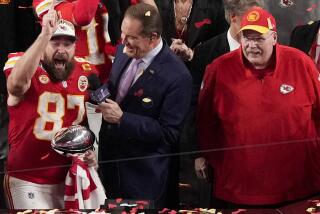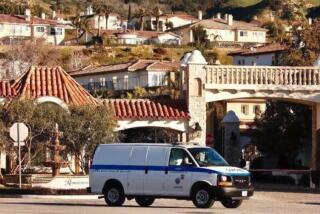Bombing Targets Pinpointed by Reid
WASHINGTON — In the summer before the Sept. 11 terrorist attacks, “shoe bomber” Richard Reid traveled extensively in the Middle East scouting airplanes, rail stations, buses and hotels as potential bombing targets for Afghan terrorists, according to government documents obtained Wednesday.
His observations became the basis of a blueprint by Afghan associates for planning future terrorist attacks, the documents show, with instructions so detailed that they included when train stations would be the most crowded, which buses had the fewest military police and where airport security guards were least likely to check passengers.
Also, copies of FBI interviews with the 29-year-old British citizen reveal for the first time that Reid paid from $1,500 to $2,000 for the explosive device he had wired into his sneakers, and that while he said he sought help from associates in Eastern Europe’s “black market” to obtain the bomb materials, he nevertheless repeatedly “claimed to have devised this plan himself.”
The scouting report and the FBI interviews would have been used against him had his case gone to trial, but Reid pleaded guilty in October. The documents bolster a government sentencing memorandum released Tuesday that seeks to show Reid is so dangerous that he should be imprisoned for life.
Reid told the FBI that he educated himself by reading a “right-wing” bomb-making book and by surfing the Internet in cafes in Europe. He said it was easy to construct the bomb because he had grown up “playing with fireworks.”
He said he came up with the idea after he noticed during his travels that Israeli security officials never checked the insides of his shoes.
He said that even when he boarded American Airlines Flight 63 from Paris to this country 13 months ago, airport screeners had him remove his shoes. But he said they still did not find the explosive device he had wired into the soles.
FBI records show the plane was at cruising altitude on Dec. 22, 2001, when Reid calmly removed his right shoe and prayed quietly to himself. He then lighted six matches in succession in a desperate but vain attempt to ignite the bomb that authorities said would have knocked a hole in the aircraft skin and most likely sent it plunging 32,000 feet to the sea with nearly 200 people aboard.
Reid knew he was ready to die, he told the FBI, and had planned to scream “Allahu akbar” (Arabic for “God is great”) loud enough so that -- he hoped -- his voice would be the last sound recorded on the plane’s voice recorder box.
But he never managed to properly light the fuse, and instead he was restrained and arrested when the flight was diverted to Boston. There, he abruptly pleaded guilty and now faces a maximum sentence of life in prison with no parole when he goes to court Jan. 30.
The report details his travels from June to August 2001. He was then using the alias Abdul Ra’uff.
The FBI said it recovered the report in late 2001 from a computer in Afghanistan, after the war on terrorism had begun against the Taliban in that country. It was located on a hard disk drive and had been “encrypted in Arabic Microsoft Word.”
The document begins with Reid traveling to Pakistan and then to a hotel in Amsterdam, where he stayed for 10 days. For a while, he scouted the British Embassy and its gardens as a potential target. Another time, he washed his passport to make it look old and brittle and to hide many of the countries he had visited, especially Pakistan.
At the airport he tested the security for Israel’s El Al airlines and complained when screeners went through his bags and “ruined” his tape recorder. Flying to Tel Aviv, he closely watched the activity of the pilots, deciding that the landing approach seemed a good time to breach the cockpit.
For days he roamed Tel Aviv, riding buses and checking train stations. He photographed churches and tall buildings, and noted when certain streets and other public places were most filled with people, the FBI said.
He recorded how many military guards rode on which buses, what train stations conducted the most thorough bag searches, and the colors and routes of other public transportation that catered to Jewish passengers.
At the Western Wall, for instance, he “found that security from among the Israelis over there to be quite minimal.”
In Haifa, he discovered that at the train station “if the guard is busy it is possible to enter without being searched.”
“There is an exceptionally good opportunity to strike [to bomb] the train or station especially on Saturday night,” the report said.
“If the striker [bomber] was unable to enter the train station without being searched, it is then possible to strike [bomb] the reception-goodbye area.... It is a place that can be entered without being searched; besides, it contains at least 100 people at the arrival time of any given train.”
Reid later traveled to Egypt and Turkey, where he moved about with equal ease. In Ankara, for instance, authorities took his passport and “examined it under a microscope.” Nevertheless, “he was let go.”
Reid told the FBI that he was arrested for street robbery when he was 18 or 19 years old, and served 3 1/2 years in England.
“During his term in jail, he was introduced to the Muslim religion by some Pakistani inmates,” the FBI interview reports state. “Also, while incarcerated, he discontinued the use of the hallucinogenic drug, LSD; however, [he] continued to use hashish.
“Shortly after accepting the Muslim faith, he quit using all drugs and discontinued drinking alcohol. It was then that he chose his Muslim name.”
During the two days of interviews, “Reid described himself as one who works and travels alone,” the reports state. “He claimed not to be traveling with anyone on this flight nor any other flights which he has taken in the past.”
His summer 2001 travels in the Middle East “emboldened him to attempt to act against the West when he witnessed the many checkpoints and travel restrictions on Muslims.” It angered him that “Jews with guns” patrolled inside the mosques.
While in Amsterdam, he said, he “contacted some individuals on the black market who supplied him with the materials he used to construct” the shoe bombs. But he claimed he did not know who these people were, except that they “may have been of Czechoslovakian descent.”
He said the sellers were not Muslims, and that they did not know he practiced Islam. They provided him with high-grade plastic explosives, a detonation cord, ignition and fuses, he said.
Reid said he built the bomb while living in outdoor parks in Holland. He said he bought the ankle-high sneakers “somewhere in Europe.”
Then he cut the soles off with a knife, placed the bomb ingredients in the hollowed-out soles, and glued the soles back together. He wound the detonation cord through the inside of the soles. Then he walked in the shoes for up to two months but never performed tests to see whether they would ignite.
When he went to the Paris airport, he brought Western disco tapes to make him look less suspicious. When he sat down in window seat 29J, he realized that this was “not about killing; it was about making a statement.”
Quizzed about Sept. 11, he said he knew nothing of the hijackers, except that “Allah knows best.” He said, “I’m a Muslim, that’s all that matters.” He said democracies were evil because they permitted “homosexuality, fornication, alcoholism and drug addiction -- all sins that are not condoned by God.”
Reid said he was intrigued by the 1995 Oklahoma City bombing, masterminded by Timothy J. McVeigh, a U.S. Army veteran. “At first he was happy about it, especially when he thought Muslims were responsible. He was disappointed to later learn that Muslims were not responsible and angry when he realized Muslims had been falsely accused,” the documents said.
During the interviews, the FBI asked him to name any cohorts. But Reid insisted that he had never had explosives training or ever attended a terrorist training camp. When the agents said they had information that indicated he was lying, Reid replied, simply: “Then your spies are misinformed.”
More to Read
Sign up for Essential California
The most important California stories and recommendations in your inbox every morning.
You may occasionally receive promotional content from the Los Angeles Times.











